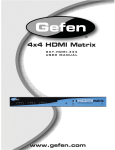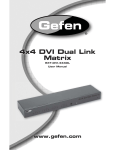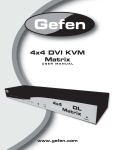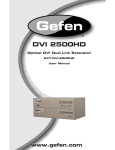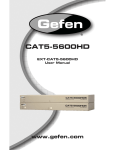Download Gefen EXT-DVI-444N video switch
Transcript
® 4x4 DVI Matrix EXT-DVI-444N USER MANUAL www.gefen.com www.gefen.com www.g en.com ASKING FOR ASSISTANCE Technical Support: Telephone Fax (818) 772-9100 (800) 545-6900 (818) 772-9120 Technical Support Hours: 8:00 AM to 5:00 PM Monday thru Friday PST (Pacific Standard Time) Write To: Gefen, Inc. c/o Customer Service 20600 Nordhoff Street Chatsworth, CA 91311 www.gefen.com [email protected] Notice Gefen Inc. reserves the right to make changes in the hardware, packaging and any accompanying documentation without prior written notice. The 4x4 DVI Matrix is a trademark of Gefen Inc. All trademarks are the property of their respective owners. © 2009 Gefen Inc., All Rights Reserved Rev X1 TABLE OF CONTENTS 1 Introduction / Operation Notes 2 Features 3 Panel Layout 4 Using the 4x4 DVI Matrix 5 RMT16-IR Installation 6 IR Codes 7 Dip Switch Guidelines 8 RS-232 Interface 9 4x4 DVI Matrix Rack Mount Diagram 10 Specifications 11 Terminology 12 Troubleshooting 13 Troubleshooting Diagram 14 Warranty INTRODUCTION Thank you for purchasing the 4x4 DVI Matrix. The 4x4 DVI Matrix switches four DVI sources to any four DVI displays. The 4x4 DVI Matrix switcher has four DVI inputs and four DVI outputs. Matrix input #1 and the DVI port of DVI source #1 connects using a male to male DVI cable. The DVI port of DVI source #2 connects to DVI input #2. The DVI port of DVI source #3 connects to DVI input #3. The DVI port of DVI source #4 connects to DVI input #4. There are four (4) DVI outputs connecting to four (4) different displays. Note: The switching is done by using either the RMT-16-IR remote control or through the RS232 port. The 4x4 DVI Matrix is rack mountable. OPERATION NOTES READ THESE NOTES BEFORE INSTALLING OR OPERATING THE 4X4 DVI MATRIX • The 4x4 DVI Matrix is housed in a metal box for better RF shielding. • The 4x4 DVI Matrix works with all DVI and HDMI displays. • The 4x4 DVI Matrix supports VIDEO signals only. NOTE: The 4x4 DVI Matrix is not HDCP compliant. 1 FEATURES Features • Allows any DVI display to view any source at any time • Allows any source to be displayed on multiple displays at the same time • Maintains resolutions up to 1080p, 2K, and 1920x1200 • Maintains highest DVI single link video resolution • DVI or HDMI to DVI cables are used to connect the inputs and outputs of the matrix • Each display's inputs can be switched with the IR remote control or through RS232 Includes: (1) 4x4 DVI Matrix (4) DVI 6ft Male to Male Cables (1) 24VDC Locking Power Supply (1) User Manual (1) RMT-16IR Remote Control (1) Rack Ears 2 DVI Inputs Back Panel DVI Outputs Display 1 LED Display 2 LED Display 3 LED Display 4 LED IR Extender Eye Port Indicator Indicator Indicator Indicator IR Sensor Front Panel 3 Connects to 5VDC Power Supply RS232 Controller Port Power Indicator PANEL LAYOUT USING THE 4X4 DVI MATRIX 1 Connect all the sources to the DVI inputs on the 4x4 DVI Matrix, using the supplied cables. 2 Connect the HDMI/DVI displays to the outputs on the 4x4 DVI Matrix. 3 Connect the power supply to the 4x4 DVI Matrix. Be sure to screw in the locking connector firmly. 4 Controlling the 4x4 DVI Matrix using the RMT16-IR: Pressing Buttons... 1-4 5-8 9-12 13-16 Switches... Display 1 to view Source 1, 2, 3, or 4 Display 2 to view Source 1, 2, 3, or 4 Display 3 to view Source 1, 2, 3, or 4 Display 4 to view Source 1, 2, 3, or 4 *Note for computers connected to the DVI Matrix - When your computer boots up, it looks for an EDID (extended display identification data) from the display to tell it what monitor is connected and what resolution to output. During boot up of the computer you should have ONLY one output selected to one input at a time so that the computer gets the EDID of the display that is selected. If you have multiple outputs selected to one computer, the computer will read the EDID of the last output selected to it. If all your displays are the same, or all displays are capable of running at the same resolution then this step does not matter. You can also use a DVI Detective to eliminate the need to have that matrix selected to the computer during bootup. 4 RMT16-IR Installation 1. Remove battery cover from the back of the RMT16-IR remote. 2. Verify that dip switches 1 & 2 are in the down (OFF) position. 3. Insert the battery, hold the battery so that you can see the positive side facing up. The side that is not marked must be facing down. 4. Test the RMT16-IR remote by pressing ONLY one button at a time. The indicator light on the remote will flash once each time you press a button. WARNING: Do not press multiple buttons simultaneously and do NOT press buttons rapidly. These actions will cause the remote to reset and steps 1-4 will have to be repeated. Note: The RMT16-IR ships with two batteries. One battery is required for operation, the second battery is complimentary. 5 IR CODES In the event of IR conflicts, please do the following: 1. Remove the battery cover from the back of the RMT16-IR remote. 2. Locate the Dip Switches above the batteries 3. Switch the Dip Switches on the RMT16-IR to any of the combinations pictured below. 4. Dip Switches 1 and 2 in the RMT16-IR correspond with Dip Switches 1 and 2 inside the 4x4 DVI Matrix respectively. Switch the switches inside the 4x4 DVI Matrix to match the same Remote Channel as the RMT16-IR. The 4x4 DVI Matrix is now set to a new IR Code. Remote Channel 1: Remote Channel 0: 1 2 1 2 1 2 Remote Channel 3: Remote Channel 2: 1 2 6 DIP SWITCH GUIDELINES Underneath the 4x4 DVI Matrix are two banks of Dip Switches. Below is a table describing their functions. By default, the Bank of 8 switches are set of to the Off position and the other bank of 4 switches are set to ON. The bank of 4 dip switches are service switches and should not be changed from their ON position. Dip Switch# Name Description 1 IR Code Dip Switch Corresponds to Dip Switch 1 on RMT-16-IR 2 IR Code Dip Switch Corresponds to Dip Switch 2 on RMT-16-IR 3 Unused Unused 4 Unused Unused 5 Unused Unused 6 Unused Unused 7 Unused Unused 8 Unused Unused Remove Tape Front 2 3 4 1 2 3 4 5 6 7 8 Bottom 7 IR Switches RS-232 INTERFACE Binary Table ASCII Corresponding RMT16-IR Button 1 1 2 2 3 3 4 4 5 5 6 6 7 7 8 8 Binary ASCII Corresponding RMT16-IR Button 9 9 a 10 b 11 c 12 d 13 e 14 f 15 g 16 0011 0001 0011 0010 0011 0011 0011 0100 0011 0101 0011 0110 0011 0111 0011 1000 Binary 0011 1001 0110 0001 0110 0010 0110 0011 0110 0100 0110 0101 0110 0110 0110 0111 RS232 Settings Bits per second ....................................................................................... 19200 Data bits .......................................................................................................... 8 Parity ........................................................................................................ None Stop bits ...........................................................................................................1 Flow Control ............................................................................................. None 8 4x4 DVI MATRIX RACK MOUNT DIAGRAM 9 SPECIFICATIONS Video Amplifier Bandwidth .................................................................165 MHz Input Video Signal ......................................................................... 1.2 volts p-p Input DDC Signal .................................................................... 5 volts p-p (TTL) DVI Connector..................................................DVI-I 29 pin female (digital only) Single Link Range .............................................................1080p / 1920 x 1200 Remote Control Port ............................................ RS-232 Female, Mini-Stereo Power Consumption .................................................................. 60 watts (max) Power Supply ........................................................................................24V DC Rackmountable: (rack ears included).........................................1U Rack Space Dimensions ............................................................. 17” W x 1.75” H x 5.875” D Shipping Weight ..................................................................................... 10 lbs. 10 TERMINOLOGY DDC Short form for Display Data Channel. It is a VESA standard for communication between a monitor and a video adapter. Using DDC, a monitor can inform the video card about its properties, such as maximum resolution and color depth. The video card can then use this information to ensure that the user is presented with valid options for configuring the display. DDWG Digital Display Working Group DDWG are the creators of the DVI specification. DVI Digital Visual Interface. Connection standard developed by Intel for connecting computers to digital monitors such as flat panels and DLP projectors. A consumer electronics version, not necessarily compatible with the PC version, is used as a connection standard for HDTV tuners and displays. Transmits an uncompressed digital signal to the display. The latter version uses HDCP copy protection to prevent unauthorized copying. HDCP High-Bandwidth Digital Content Protection. Created by Intel, HDCP is used with HDTV signals over DVI and HDMI connections and on D-Theater D-VHS recordings to prevent unauthorized duplication of copy written material. HDMI The High-Definition Multi-media Interface (HDMI) is an industry-supported, uncompressed, all-digital audio/video interface. HDMI provides an interface between any compatible digital audio/video source, such as a set-top box, DVD player, and A/V receiver and a compatible digital audio and/or video monitor, such as a digital television (DTV). HDTV High-Definition Television. The high-resolution subset of our DTV system. The ATSC defines HDTV as a 16:9 image with twice the horizontal and vertical resolution of our existing system, accompanied by 5.1 channels of Dolby Digital audio. The CEA defines HDTV as an image with 720 progressive or 1080 interlaced active (top to bottom) scan lines. 1280:720p and 1920:1080i are typically accepted as high-definition scan rates. RS-232 Recommended Standard 232. This is the de facto standard for communication through PC serial ports. It can refer to cables and ports that support the RS232 standard. VESA Video Electronic Standards Association, a consortium of manufacturers formed to establish and maintain industry wide standards for video cards and monitors. VESA was instrumental in the introduction of the Super VGA and Extended VGA video graphics standards with a refresh rate of 70 Hz, minimizing flicker and helping to reduce user eyestrain and fatigue. 11 TROUBLESHOOTING If there is any video noise that appears on your output displays, you can resolve them by using the methods described in this section. AUTO EQUALIZATION Auto equalization is set to ON by default, but in some cases you may have to manually equalize the incoming source signal to eliminate video noise that occurs. Since the equalization is used only on the incoming source signal, manual adjustment of equalization should only be used when the video noise is coming through on a particular incoming source. This is easy to test, as all displays that access this source will exhibit the same type of noise, while other sources will not. Typical video noise can be described as "snow" or brightly colored pixels that are sometimes referred to as "sparkles". To switch auto equalization off, look on the underside of the 4x4 Matrix and locate the 2 banks of dip switches. They will be covered by some metallic tape that normally conceals their location. There is a bank of 8 dip switches with a bank of 4 dip switches right below it. By default, the bank of 8 dip switches will all be set in the OFF position while the bank of 4 dip switches, which are for auto equalization, will be set to ON. First, determine which display output port is exhibiting the image issue and turn OFF the corresponding auto equalization dip switch using the guide below. Then locate the corresponding equalization trim pot (Located on the diagram on the next page) on the underside of the 4x4 Matrix and turn it in small increments in either a clockwise or counter-clockwise motion until the image clears and no longer exhibits any noise. PRE-EMPHASIS If your input source signals are displaying fine, whether it is using auto or manual equalization, but you're experiencing issues with particular displays, your cable run may be too long and a pre-emphasis can be added to account for the distance that the signal will have to travel. To do this, first determine which display output port is exhibiting this issue, and using the dip switch guideline below, turn on pre-emphasis for that particular port. Using both of these techniques, individually or in conjunction, will help you tune in your signal to get the best possible image quality out of your Gefen 4x4 DVI KVM Matrix. 8 Dip Switch Bank (Pre-emphasis) Dip Switch # Name 1 IR Code Dip Switch 2 IR Code Dip Switch 3 Unused 4 Unused 5 Output 4 pre-emphasis 6 Output 3 pre-emphasis 7 Output 2 pre-emphasis 8 Output 1 pre-emphasis Description Corresponds to Dip Switch 1 on RMT16-IR Corresponds to Dip Switch 2 on RMT16-IR Unused Unused Output 4 pre-emphasis Output 3 pre-emphasis Output 2 pre-emphasis Output 1 pre-emphasis 4 Dip Switch Bank (Auto-Equalization) Dip Switch # Name 1 Auto EQ for Display 1 2 Auto EQ for Display 2 3 Auto EQ for Display 3 4 Auto EQ for Display 4 Description Auto/Manual Equalization for display 1 Auto/Manual Equalization for display 2 Auto/Manual Equalization for display 3 Auto/Manual Equalization for display 4 12 1 2 3 4 1 2 3 4 5 Equalization Trim Pot Display 1 Equalization Trim Pot Display 2 Equalization Trim Pot Display 3 Equalization Trim Pot Display 4 6 7 8 TROUBLESHOOTING - DIAGRAM Remove Tape Front Bottom 13 Pre-Emphasis Switches Auto Equalization Switches WARRANTY Gefen warrants the equipment it manufactures to be free from defects in material and workmanship. If equipment fails because of such defects and Gefen is notified within two (2) years from the date of shipment, Gefen will, at its option, repair or replace the equipment, provided that the equipment has not been subjected to mechanical, electrical, or other abuse or modifications. Equipment that fails under conditions other than those covered will be repaired at the current price of parts and labor in effect at the time of repair. Such repairs are warranted for ninety (90) days from the day of reshipment to the Buyer. This warranty is in lieu of all other warranties expressed or implied, including without limitation, any implied warranty or merchantability or fitness for any particular purpose, all of which are expressly disclaimed. 1. Proof of sale may be required in order to claim warranty. 2. Customers outside the US are responsible for shipping charges to and from Gefen. 3. Copper cables are limited to a 30 day warranty and cables must be in their original condition. The information in this manual has been carefully checked and is believed to be accurate. However, Gefen assumes no responsibility for any inaccuracies that may be contained in this manual. In no event will Gefen be liable for direct, indirect, special, incidental, or consequential damages resulting from any defect or omission in this manual, even if advised of the possibility of such damages. The technical information contained herein regarding the features and specifications is subject to change without notice. For the latest warranty coverage information, please visit Gefen’s Warranty web page at http://www.gefen.com/kvm/aboutus/warranty.jsp PRODUCT REGISTRATION Please register your product online by visiting Gefen’s web site at http://www.gefen.com/kvm/Registry/Registration.jsp 14 *ma-DVI-444n* Rev X1 20600 Nordhoff St., Chatsworth CA 91311 1-800-545-6900 818-772-9100 www.gefen.com Pb fax: 818-772-9120 [email protected]
























